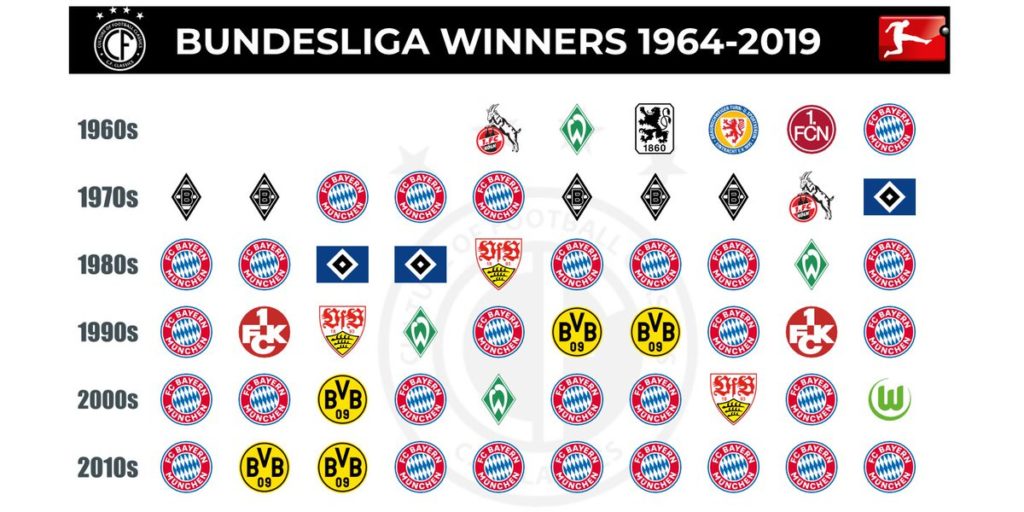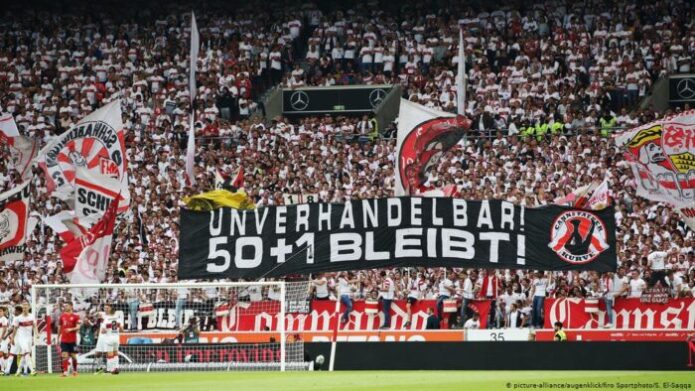Mine of talent is what you can call Bundesliga which is the German top-flight league in professional football. The league keeps producing young and promising talents season in season out giving them the stage to exhibit their dexterity at the highest level.

Though there has been a Bayern monopoly for a long while, the league is still exciting with open plays and lots of goals. The fast-paced game spontaneously creates the atmosphere in the stadium for which the Bundesliga is renowned across the world.
History of Bundesliga
Around the late 1940s, Germany hadn’t had the central league in football, while across the different countries in Europe the professional leagues had already started to flourish. Germany only had the sub-regional leagues which obviously didn’t expose the players to professional football. These semi-professional German players at the international level couldn’t cope up with the skills and professionalism of the players from other nationalities.

The lack of a central league also attracted many of Germany’s promising youngsters to go abroad and play professional leagues there. Quite clearly, the entire ecosystem was draining out the talent Germany possessed and other leagues were using it to their advantage.
In the 1962 World Cup, Germany was beaten 0-1 by Yugoslavia and the defeat ignited the demand for the central league. On 28 July 1962, Bundesliga was created with the inaugural season scheduled to commence in 1633-64 season.
Also Read: List of Top-10 Highest Goal Scorer in 21st Century
What is the Format of Bundesliga?
The top-tier German football has a total of 3 tiers. Bundesliga is a top-tier tournament, which is followed by second-tier 2 Bundesliga and then 3 tier Bundesliga.

Bundesliga is played with 18 teams and not with 20 as per the other top leagues in Europe. The bottom two sides in Bundesliga at the end of the season are relegated to 2nd tier Bundesliga and the top two teams from 2nd tier Bundesliga are promoted to Bundesliga in the next season. The 16th placed Bundesliga side and 3rd placed 2nd tier Bundesliga side faces each other in a two-legged Playoff game which decides their fate for the next season.
European Qualification
Bundesliga is one of the top European football leagues, the top 4 teams at the end of the season qualify for the UEFA Champions League, while the 5th placed team gets an entry to the group stages of the UEFA Europa League. The 6th placed club has to go through a third qualification round to secure their place in the group stages of the UEFA Europa League.
The 50+1 Rule
Many renowned clubs over Europe and especially in the English Premier League have been owned by foreign millionaires. They brought money to the game. In today’s football, we see an outrageous amount of transfer fees being paid and paid easily by these super-wealthy owners. Though football is a fan-oriented sport, these big spenders have literally become the ‘owner’ of the club and they can take absolutely any decision about the clubs. Well, we have recently seen the owner’s unsuccessful attempt to form the notorious Super League.
These things don’t happen in German Football and Bundesliga. The organizers are quite pious towards traditional football and hence to keep foreign investors out of the game, they have the 50+1 rule.
The rule states that, should a football club outsource its professional football operation into a separate limited company, the parent club must retain 50% of the voting shares in that company, plus one share. Thus the rule prevents any foreign millionaires from buying the club.

Bundesliga has the lowest price for tickets and the highest attendance among the European top-flight leagues, the 50+1 rule is primarily the reason behind this.
The rule has its demerits as well. Except for Bayern Munich, no team has really spent big money on the transfers as they don’t have the amount of money. The foreign investors might uplift them from the financial crisis, but no investor wants to invest in the clubs when their voting rights could be limited up to 49%.
Most of the revenue of Bundesliga clubs comes from fans and tickets. During the pandemic, the closed-door games took a chunk of revenue away from the clubs. Though the fans have returned to the stadiums, the clubs are yet to recover from the doleful situation.
Germans are devoted to their fan-oriented football and it would be a huge surprise if the 50+1 rule gets revoked.
Also Read: List of Top Five Highest Goal Scorers in UEFA Championship in 2020-2021
Let’s see Bundesliga through stats
Club Performances
| Club | Winners | Runners-up |
| Bayern Munich | 30 | 10 |
| Borussia Dortmund | 5 | 7 |
| Borussia Mönchengladbach | 5 | 2 |
| Werder Bremen | 4 | 7 |
| Hamburger SV | 3 | 5 |
| VfB Stuttgart | 3 | 2 |
| 1. FC Kaiserslautern | 2 | 1 |
| 1. FC Köln | 2 | 5 |
| 1. FC Nürnberg | 1 | |
| 1860 Munich | 1 | 1 |
| Eintracht Braunschweig | 1 | |
| VfL Wolfsburg | 1 | 1 |
| Alemannia Aachen | — | 1 |
| Bayer Leverkusen | — | 5 |
| Hertha BSC | — | 1 |
| Meidericher SV | — | 1 |
| RB Leipzig | — | 2 |
| Schalke 04 | — | 7 |
Most Appearances in Bundesliga
| Player | Apps | Years | Club(s) |
| Charly Körbel | 602 | 1972–1991 | Eintracht Frankfurt(602) |
| Manfred Kaltz | 581 | 1971–1991 | Hamburger SV (581) |
| Oliver Kahn | 557 | 1987–2008 | Karlsruher SC (128), Bayern Munich (429) |
| Klaus Fichtel | 552 | 1965–1988 | Schalke 04 (477), Werder Bremen (75) |
| Miroslav Votava | 546 | 1976–1996 | Borussia Dortmund (189), Werder Bremen (357) |
| Klaus Fischer | 535 | 1968–1988 | 1860 Munich (60), Schalke 04 (295), 1. FC Köln (96), VfL Bochum (84) |
| Eike Immel | 534 | 1978–1995 | Borussia Dortmund (247), VfB Stuttgart (287) |
| Willi Neuberger | 520 | 1966–1983 | Borussia Dortmund (148), Werder Bremen (63), Wuppertaler SV (42), Eintracht Frankfurt (267) |
| Michael Lameck | 518 | 1972–1988 | VfL Bochum (518) |
| Uli Stein | 512 | 1978–1997 | Arminia Bielefeld (60), Hamburger SV (228), Eintracht Frankfurt (224) |
Most Goals in Bundesliga
| Player | Goals | Apps | Ratio | Years | Club(s) |
| Gerd Müller | 365 | 427 | 0.85 | 1965–1979 | Bayern (365/427) |
| Robert Lewandowski* | 284 | 354 | 0.80 | 2010– | Dortmund (74/131), Bayern (210/224) |
| Klaus Fischer | 268 | 535 | 0.50 | 1968–1988 | 1860 Munich (28/60), Schalke (182/295), Köln (31/96), Bochum (27/84) |
| Jupp Heynckes | 220 | 369 | 0.60 | 1965–1978 | M’gladbach (195/283), Hannover (25/86) |
| Manfred Burgsmüller | 213 | 447 | 0.48 | 1969–1990 | Essen (32/74), Dortmund (135/224), Nürnberg (12/34), Bremen (34/115) |
| Claudio Pizarro | 197 | 490 | 0.40 | 1999–2020 | Bremen (109/250), Bayern (87/224), Köln (1/16) |
| Ulf Kirsten | 181 | 350 | 0.52 | 1990–2003 | Leverkusen (181/350) |
| Stefan Kuntz | 179 | 449 | 0.40 | 1983–1999 | Bochum (47/120), Uerdingen (32/94), K’lautern (75/170), Bielefeld (25/65) |
| Dieter Müller | 177 | 303 | 0.58 | 1973–1986 | Offenbach (0/2), Köln (159/248), Stuttgart (14/30), Saarbrücken (4/23) |
| Klaus Allofs | 177 | 424 | 0.42 | 1975–1993 | Düsseldorf (71/169), Köln (88/177), Bremen (18/78) |
For more such interesting & unheard facts about cricket and sports, please visit thesportslite.com frequently.
Thank you for visiting. Have a good day ahead 🙂

